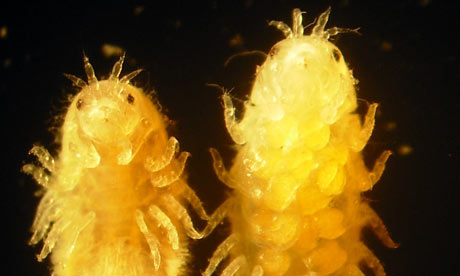
Link....
Just what, you may ask, is a gribble? It’s a tiny marine isopod, and it eats wood. For centuries, they destroyed wooden ships. Today, they continue to munch away on docks and piers. Unlike creatures such as termites, however, gribbles have no helpful microbes in their digestive system to help them digest wood - they themselves possess the enzymes necessary for converting it to sugar. British researchers are now suggesting that what works for the gribbles could also work for converting wood waste and straw into liquid biofuels.
The research was conducted by scientists at the BBSRC Sustainable Bioenergy Center at the Universities of York and Portsmouth. They came to their conclusions by examining genes found in the guts of the gribbles. The isopods’ digestive tracts, they discovered, are dominated by enzymes that attack the polymers that make up wood. One of the most abundant enzymes is a cellulose-degrading enzyme, never before seen in any other animal.
The researchers at York are now trying to determine just how the enzymes work, and whether they can be adapted to industrial applications. "The world needs to quickly reduce its dependence on fossil fuels†said Duncan Eggar, BBSRC Bioenergy Champion. “Sustainably produced bioenergy offers the potential to rapidly introduce liquid transport fuels into our current energy mix."
The research was conducted by scientists at the BBSRC Sustainable Bioenergy Center at the Universities of York and Portsmouth. They came to their conclusions by examining genes found in the guts of the gribbles. The isopods’ digestive tracts, they discovered, are dominated by enzymes that attack the polymers that make up wood. One of the most abundant enzymes is a cellulose-degrading enzyme, never before seen in any other animal.
The researchers at York are now trying to determine just how the enzymes work, and whether they can be adapted to industrial applications. "The world needs to quickly reduce its dependence on fossil fuels†said Duncan Eggar, BBSRC Bioenergy Champion. “Sustainably produced bioenergy offers the potential to rapidly introduce liquid transport fuels into our current energy mix."

Comment